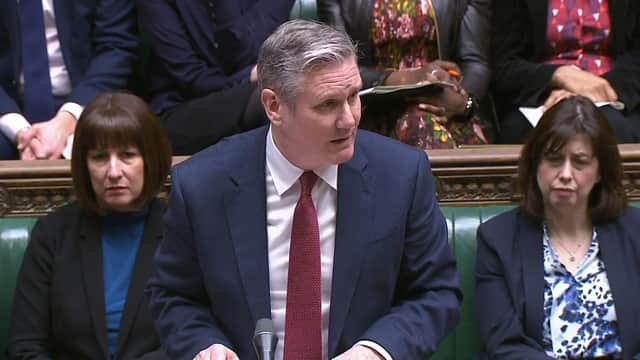Readers' Letters: Thwarting parliamentary debate no was to fix Gaza


Sir Keir Starmer admitted that he had "urged" Sir Lindsay to widen the debate, glossing over the many connotations of "urged". When the leader of Sir Lindsay's former party urged him to consider his proposed changes to the SNP bill, intentionally or not, he put the Speaker under pressure.
Then, the Labour party speakers "talked out" the time allocated to the debate. This is a well known manoeuvre, used by all parties, to prevent a bill being heard. It requires considerable preparation and practice and was efficiently carried out by members of HM Opposition so whatever manoeuvre Sir Keir oversaw, it certainly wasn't a spontaneous response to that morning's change of heart by the Speaker. It was a pre-planned wrecking strategy.
Advertisement
Hide AdAdvertisement
Hide AdThe Labour Party's Bill was then carried which allowed Sir Keir to avoid facing a rebellion by many of his MPs. and prevented him from having to deal with a public rebellion by the Labour Party in Scotland.
Brian Wilson, in his article, "Flynn could have been unlikely statesman if he'd sought allies", claims that "Everyone wanted a ceasefire" so why were Labour MPs so reluctant to say so publicly? Mr. Wilson says that Mr. Flynn "might have emerged as the unlikely statesman" or Sir Keir might have, if he had not been so afraid of showing leadership and sorting out the differences in his own party.
The war in Gaza is complex and, as far as I can see, no-one has a solution to it but thwarting a parliamentary debate - even another debate - is not how it should be handled. Admitting that the UK parliament doesn't have an answer to it but is prepared to allow the topic to be discussed again and again as the war continues shows strength, not weakness. Stifling debate indicates that the Labour Party is afraid to acknowledge that their "party line" could not be held.
Lovina Roe, Perth
Fitting memorial
The dedicated life of the incredibly courageous Alexei Navalny who tragically died suddenly in a Russian prison camp at the age of only 47 must not be forgotten. Democracy will not come quickly to Russia’s people, certainly as long as Vladimir Putin is in power, but recognition in the West, whether through posthumous awards, memorials or even monuments, can help foster the belief of many in Russia that democratic government can be achieved.
In the meantime sanctions on Putin’s Russia could include preventing refined oil and gas from India and China from coming to the UK which could invest in sustaining refining capacity at Grangemouth, as well as belatedly in the Acorn CCS project for the North Sea, perhaps exploiting the frozen assets of Putin’s Russian allies.
Stan Grodynski, Longniddry, East Lothian
Jobs are the solution
One of the topics on the BBC Sunday Show was the drastic cuts councils are having to make, not just in libraries and sports centres but core services like education and capital projects and no doubt this will soon extend to social care.
The reason given is Westminster doesn't give Holyrood enough money. It's becoming clear what one of the main causes is. According to the Office for National Statistics (ONS) there are 5.6 million people in the UK on out of work benefits, only 1.4 million are looking for work and there are 900,000 job vacancies.
Covid is, as usual, blamed for this rise, but most other countries have bounced back, especially France which has 1.2 million more people back in work. In this country 53 per cent of people on long-term sickness benefits blame depression, anxiety or bad nerves. The difficulty in finding people to fill these 900,000 vacancies is one of the reasons why we have over 700,000 legal immigrants every year.
Advertisement
Hide AdAdvertisement
Hide AdThe bottom line is this fall in employed people has an adverse effect on our GDP, tax receipts and and public spending, so something has to give, and if it's not getting people out to work it means cuts to other public services and – with the threat of war, cuts to defence spending when we should be increasing our deterrence.
It's a big problem, and now that even the SNP's new Economy Minister Mairi McAllan has highlighted the problem and vowed to find solutions perhaps some cross party discussion and action is possible.
Allan Sutherland, Stonehaven
Fast-track justice
Victims of the Post Office Horizon scandal in Scotland could face longer waits for justice if the SNP don’t follow UK Government legislation.
Humza Yousaf has been told that it is his responsibility to fast-track legislation or Scottish victims of the Post Office Horizon scandal. There must be no further delay before these appalling miscarriages of justice are put right, which is why we need clarity from Mr Yousaf about what action the government will take next.
Mr Yousaf must follow the lead of the UK Government’s fast-tracked legislation, so that Scottish victims of the Horizon scandal are not kept waiting any longer for justice than their counterparts in England and Wales.
Cllr Alastair Redman, Port Charlotte, Isle of Islay
NHS investment
It’s good to see that Professor Hugh Pennington is listening (Letters 24 February).
The Scottish Government didn’t listen to him in 2020; I hope they pay heed now. We cannot wait for the outcome of the Covid Enquiry. We need the Government to act now to invest in the NHS and prepare properly for the next pandemic, whenever it comes.
Fiona Garwood, Edinburgh
Comments
Want to join the conversation? Please or to comment on this article.